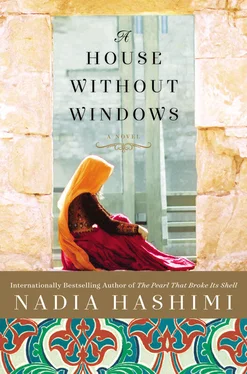Gulnaz listened intently and thought back to the biscuits she’d brought in for their last meeting. The judge was a thin man, and she hadn’t expected him to eat so many. She’d come empty-handed today and wondered if that had been a wise decision.
“There’s something else we need to discuss,” the judge said, leaning forward in his chair. His elbows rested on his desk and he stroked his beard twice before continuing. “I’ve received a report from the chief of police in Khanum Zeba’s village. Several people have provided statements to the police chief, Hakimi, about Zeba.”
Yusuf felt the hairs on the back of his neck stand. Gulnaz’s left eye twitched once, which she took to be a good omen.
“What statements?” asked the prosecutor.
“There are quite a few, actually, but they are from various people who bear no relation to the defendant. They are comments about her behavior in the weeks before her husband was killed, and I must say, they are quite interesting.”
“What do they say?” Yusuf asked cautiously.
“I will read parts to you,” offered the judge, nudging his eyeglasses to the bridge of his nose as he pulled a handful of papers from a folder. “Here’s the first. It’s from a woman who lives not far from the defendant. She states, ‘I noticed this woman following me home several times. I paid attention since I am alone with my children in the home and my husband died a few years ago. She tried to see through a crack in my gate and I witnessed her doing the same to my neighbors’ homes. She looked to be speaking to herself, and when I asked her to leave, she did not seem to hear me.’”
Yusuf was baffled for a moment.
“Another reads, ‘I did not know this woman very well as she lived a few blocks from my home, but I had seen her from time to time in the market. More than once, I saw her whispering to cans of cooking oil and bags of flour in shops. She didn’t know I was watching and I didn’t mean to snoop but she has a daughter the same age as mine. I could not help but notice.’”
“This cannot seriously be considered part of the case,” the prosecutor lamented.
“But why not? If we are going to be part of a legitimate process, these must be included as evidence. This is part of the investigation. This is witness testimony. This is how things will be done in the Afghanistan of tomorrow and we will start it here, today!”
The judge felt years younger, as if he were at the beginning of a career instead of winding down the end of one. Gulnaz raised an eyebrow. Qazi Najeeb’s chest puffed a bit, interpreting her reaction optimistically.
“This one is most interesting. ‘I saw Khanum Zeba twice on my route selling things throughout the town. Both times it was just before her husband was killed. She was walking down our street, and after every few feet, she would stop and pick up a small rock or a handful of dirt and put it into her mouth. I asked her why she was doing that, but she only growled at me like a stray dog and hurried off before I could ask anything else. I could see the crazy in her eyes that day. You would have to be a blind man not to see it.’”
“So they’re all saying that she was insane?” Yusuf asked. What had happened in that village? He thought back to his conversations and wondered why so many people could be volunteering accounts of Zeba’s bizarre behavior.
Gulnaz took out a handkerchief and dabbed at her forehead. The air in the judge’s office was stifling. It was no wonder her daughter had shrieked her head off in here.
“That’s what a lot of people are saying. And the police chief, Hakimi, told me that each of these witnesses came to him on his own. Some were nervous, he said. Others said they felt badly that this woman should be in prison at all since it didn’t seem like she was in her right mind at all. And, what’s more, people didn’t have anything good to say about her husband, which is odd given that he was murdered. No one likes to speak ill of the dead, but some even called him a cheater, a liar, or a godless man.”
“That doesn’t mean she should have killed him,” the prosecutor insisted, more out of obligation than anything else.
Gulnaz shot Yusuf a look. The young lawyer had gone to the village and knocked on doors. He’d walked through her daughter’s home and met with Hakimi himself. What had he done there? All these people saying Zeba was madder than a sandstorm. . could this be his doing? Or could these accounts actually be true?
Gulnaz lowered her gaze to the floor. Her shoes blurred through her teary eyes.
The pain of watching her husband walk away had never left her. She’d wanted so much for Zeba to have a life free of dark curses. Secretly, she’d been glad Zeba had turned away from the jadu she practiced at home. When Zeba had grown resentful of her mother, Gulnaz had not faulted her. Zeba had believed her mother to be angry with her for the distance she’d put between them, but it was not true. Gulnaz had only ever been angry with herself.
It was heavy, the weight of all the troubles she’d caused and the revenge she’d sought. Gulnaz never fell asleep until well into the night and then only after she’d taken a mental inventory of her children’s heartaches and all the things she could not change. When it was most quiet, she found herself at the window of the room she kept in her son’s small home, her ear to the night listening for the sound of something intended only for her — a laugh, a howl, a heartfelt apology.
She sat now, with knees stiff and shoulders hunched, listening to people speak of her daughter’s demons. Was this all she was meant to see on this earth? And, more important, was this her own doing? Had she been trying to make her daughter stronger or had she been looking for a way to prove herself?
She’d meant only to do right, with every step she’d taken in her life. She’d meant only to thwart someone’s evil eye or prevent a marriage that wasn’t intended or to punish someone who’d wronged her family. Even now, she meant only to save her daughter. She was nothing without her jadu, Gulnaz knew. Like a pulse, its persistence gave her life.
Qazi Najeeb was determined to make history with her daughter’s case. Men were always so frightened by their mortality that they obsessed over ways to live forever: sons to carry on their work, grandsons to carry on their name, their legacies in books, on streets, or in newspapers. Some became more desperate as their black hairs turned silver.
Yusuf seemed hesitant to say what he was thinking. This was a game of chess to him as he, too, hungered for a moment of glory. Was Gulnaz doing the same? Was she using her daughter’s plight to test her sorcery once more?
Sometimes you just don’t know when to stop, Gulnaz told herself. Gulnaz drew in a deep breath. She had much to worry about and barely enough strength.
There was no air in the office.
Gulnaz stood and picked her handbag up off the floor. The men turned and waited for her to speak, but she did not. Without a word of explanation, Gulnaz walked out of Qazi Najeeb’s office.
“Khanum? Khanum, where are you going? Are you all right?” the judge called out after her.
Yusuf wasn’t surprised that she did not turn or answer. Zeba and her mother, he’d surmised long ago, were cut from the same unruly cloth.
DURING THE DAY, ZEBA WOULD WATCH THE THICK CLOUDS DRIFT across the sky, like a flock being coaxed home by a shepherd with a tula, a wooden flute. For the first two nights, Zeba did not sleep. She would watch for the scorpion that walked past her cave, pausing to eye her with his tail curved in the air, as graceful as calligraphy. It distracted her from the meals of bread (which was often stale), black pepper, and water. The black pepper made her sneeze, five or six gunfire convulsions of her body in the span of seconds. They were like small exorcisms, each of them. The water was pumped from a well that, Zeba assumed, must have plunged deep into the ground because it was sweet with minerals, percolated through layers of rich earth. The water brought to mind her cousin.
Читать дальше











